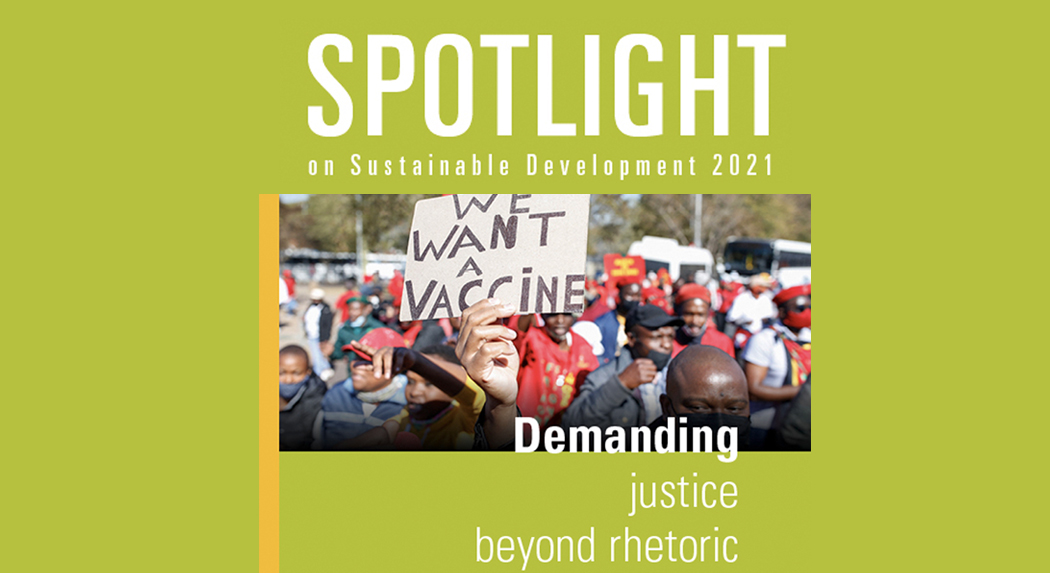
Demanding justice beyond rhetoric - SPOTLIGHT on Sustainable Development 2021
Click here to visit 2030Spotlight website.
Time to overcome contradictions and hypocrisy in the COVID-19 crisis
Global Civil Society Report on the 2030 Agenda and the SDGs
Policy responses to the COVID-19 pandemic and resulting economic crisis have greatly exacerbated national and global inequalities. Blatant examples are the unfair distribution of care work, relying mainly on women and poorly remunerated if at all, and the global disparity in the distribution of vaccines.
So far more than 60 percent of people in high-income countries have received at least one dose of COVID-19 vaccine, but less than 2 percent have done so in low-income countries. In view of this dramatic disparity, the "leave no one behind" commitment of the 2030 Agenda for Sustainable Development remains hollow.
The dominant interests of rich countries, and corporate powers continue to dominate political decision-making. Given the urgency of the COVID-19 crisis and the other unresolved global problems, most notably the climate emergency, it is high time for transformative policies at all levels.
This is the key message of the Spotlight on Sustainable Development Report 2021. The report is launched on the first day of the Global Week to #ACT4SDGS by a global coalition of civil society organizations and trade unions.
According to the report, economic justice based on human rights can be achieved, but the trend towards privatizing, outsourcing and systematic dismantling of public services must be reversed. To combat growing inequality and build a socially just, inclusive post-COVID world, everyone must have equitable access to public services, first and foremost to healthcare and education.
To prevent the COVID-19 pandemic being followed by a global debt and austerity pandemic, governments must be enabled to expand their fiscal policy space and properly tax multinational corporations and wealthy individuals, many of whom pay virtually no income tax at all. Fundamental reforms in the global financial architecture, including a debt workout mechanism beyond piecemeal relief measures for debt servicing, are long overdue.
Table of contents - Click here to download full report.
Preface
1- Diverging recovery – deepening inequalities
By Barbara Adams and Jens Martens, Global Policy Forum
Special Contribution 1.1:
The struggle for the TRIPS waiver
By K.M. Gopakumar, Third World Network
Special Contribution 1.2:
COVAX: Risks and side effects of multi-stakeholder governance
By Harris Gleckman, Associate, Transnational Institute
Special Contribution 1.3:
The WHO pandemic treaty proposal: responding to needs or playing COVID geopolitics?
By Nicoletta Dentico, Society for International Development (SID)
Special Contribution 1.4:
Challenging decades of privatization and de-funding of public services
By Daria Cibrario, Public Services International (PSI)
Special Contribution 1.5:
IMF Special Drawing Rights – a historic financial boost to counter the COVID-19 crisis?
By Bodo Ellmers, Global Policy Forum
Special Contribution 1.6:
Large corporations cash in on COVID-19 recovery
By Matti Kohonen, Financial Transparency Coalition
Special Contribution 1.7:
The UN Food Systems Summit – the wrong way to respond to the global food crisis
By Magdalena Ackermann, SID and Charlotte Dreger, FIAN
Special Contribution 1.8:
What have we learned about gender equality during the pandemic?
By Vanita Nayak Mukherjee and Shree Baphna, DAWN
Special Contribution 1.9:
Recovery in education: The imperative to support and invest in the education workforce
By David Edwards, General Secretary, Education International
2 - Exacerbated crises in many countries
By Roberto Bissio, Social Watch
Special Contribution 2.1:
Citizens Monitoring COVID-19 Response Programmes: The Philippine experience
By Social Watch Philippines
Special Contribution 2.2:
Lebanon’s multiple crises
By Rasha Fattouh, Arab NGO Network for Development (ANND)
Special Contribution 2.3:
Lessons from Colombia: To address the causes of social unrest, be serious about progressive tax reforms
By Sergio Chaparro Hernández, Center for Economic and Social Rights
Special Contribution 2.4:
Time for feminist transformative policies: Towards a national care system in Argentina
By Corina Rodríguez Enríquez, DAWN
Special Contribution 2.5:
Vulnerabilities and policy priorities for South Africa’s COVID-19 third wave
By Institute for Economic Justice (IEJ)
3 – Time for transformative policies at all levels
A rights-based economy: In critical times, a roadmap for action
By Kate Donald, Center for Economic and Social Rights (CESR)
Now is the time to reclaim public services
By Daria Cibrario, Public Services International (PSI)
Steps to prevent a global debt and austerity pandemic
By Isabel Ortiz, Global Social Justice, and Matthew Cummins, Senior Economist
Recent publications

